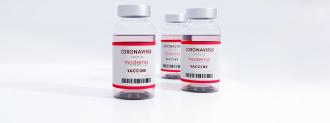The first data on a late-stage trial of Moderna’s coronavirus vaccine is in, and just like Pfizer’s recently announced trial update, the news is incredibly encouraging.
The Massachusetts-based biotech company has reported that its vaccine appears to be at least 94.5% effective at preventing coronavirus infections — a slight step up from the minimum of 90% efficacy Pfizer reported.
“This really is a significant milestone — two Monday mornings in a row with remarkable results to report of interim analysis of COVID-19 vaccine trials,” Francis Collins, Director of the NIH, said in a call with reporters.
Pfizer and Moderna’s vaccines share more than just frontrunner status in the race to beat COVID-19, too. They’re also both mRNA vaccines — a new type of vaccine that the FDA has never approved before.
Vaccines 101
When the immune system encounters a pathogen for the first time, it creates proteins called antibodies. Those antibodies will quickly identify and trigger an immune response against the pathogen if it infects the body again in the future.
Vaccines are designed to produce antibodies against a pathogen without subjecting a person to an initial infection.
Many do this by introducing a weakened or killed version of the pathogen — enough to trigger antibody production, but not enough to cause an infection. Others only use pieces of the bacteria or virus that the immune system can recognize. But mRNA vaccines do something different.
What Are mRNA Vaccines?
mRNA vaccines are also designed to trigger antibody production, but instead of delivering a weakened pathogen or pieces of it made in a lab, they use messenger RNA (mRNA) to deliver genetic code. This code instructs the body to create one piece of the pathogen, which causes the immune system to create antibodies.
That’s the theory, anyways.
Regulatory approval will be a huge validation of the RNA vaccine production platform technology.
Zoltan Kis
No one has ever fully developed an mRNA vaccine before — but after the new coronavirus exploded on the scene in 2020, both Pfizer and Moderna aimed to change that, developing and testing the vaccines in record time.
The big advantage of mRNA vaccines is how simple they are to make — all you need is the genetic code for the part of the virus that triggers antibodies. With that code, you can program a vaccine for it overnight. Moderna was able to create its COVID-19 vaccine just six weeks after the new coronavirus genome was first sequenced.
“The fact that two different (mRNA vaccines) made by two different companies…both worked so effectively confirms the concept once and for all that this is a viable strategy, not only for COVID but for future infectious disease threats,” Barry R. Bloom, a professor of public health at Harvard, told the New York Times.
Moderna’s Coronavirus Vaccine
The mRNA in Moderna’s coronavirus vaccine contains instructions for creating the coronavirus’s spike protein — the same protein triggered by Pfizer’s vaccine.
On November 16, the company reported that two doses of the vaccine appeared 94.5% effective at preventing coronavirus infections, based on preliminary data from a Phase 3 trial involving more than 30,000 people.
Of the 95 participants who developed COVID-19, 90 of the cases happened in the placebo group, while only five had received the vaccine.
Not only that, all 11 participants who developed severe cases of COVID-19 were in the placebo group. No one who got the vaccine has had a severe case, so far.
Some vaccination sites might request Moderna’s coronavirus vaccine over Pfizer’s.
William Schaffner
The majority of side effects among people who received Moderna’s coronavirus vaccine were mild or moderate. More severe side effects included fatigue, muscle aches, and pain at the injection site, but most were short-lived, and none occurred in more than 10% of vaccinated participants.
An earlier phase 1 study of Moderna’s coronavirus vaccine found that it created about as many antibodies in older adults as in younger people, and side effects were less common for older people.
After looking at the interim data from the larger phase 3 trial, the independent monitoring group reported that it didn’t find “any significant safety concerns” during its analysis.
An mRNA Milestone
Moderna’s coronavirus vaccine trial will undergo a final analysis once 151 participants develop COVID-19. At that point, Moderna will submit the analysis to the FDA as part of an Emergency Use Authorization (EUA) request.
If granted, that authorization could affect not only the current pandemic, but our ability to fight disease in the future.
“If mRNA vaccines against COVID-19 gain regulatory approval, this will be a huge validation of the RNA vaccine production platform technology,” Zoltan Kis, a research associate at Imperial College London’s Future Vaccine Manufacturing Hub, told reporters.
“Using this technology, vaccine candidates can be produced substantially faster in the future to combat virtually any infectious disease, by producing vaccines against both existing pathogens and future, currently unknown pathogens,” he continued.
What This Means for You
If Moderna gets FDA approval, it expects to deliver 20 million doses of its vaccine to the U.S. before the end of the year — enough for 10 million people, at two doses a person.
That’s less than the 50 million doses Pfizer expects to deliver this year, but Moderna’s coronavirus vaccine may have an advantage over Pfizer’s.
This vaccine presents the opportunity to use doctors’ offices and clinics as vaccination sites.
William Schaffner
Both mRNA vaccines must be stored and transported at freezing temperatures, which could make them harder to distribute than other vaccines. However, Moderna’s coronavirus vaccine requires only ordinary freezer temperatures (-4 degrees Fahrenheit), while Pfizer’s vaccine requires special freezers to keep it at an extreme -94 degrees Fahrenheit.
Additionally, Moderna has announced that its vaccine can hold up in a refrigerator for 30 days after thawing and at room temperature for 12 hours.
“This vaccine presents the opportunity of using doctors’ offices, clinics, and pharmacies as vaccination sites,” William Schaffner, an infectious disease expert at Vanderbilt University, told the NYT, adding that he could see some vaccination sites requesting Moderna’s coronavirus vaccine over Pfizer’s.
Initially, vaccine supplies will likely be reserved for high-risk people (like the elderly and nursing home residents) and healthcare workers, so it may be a few months until shots are available to the general public. But Pfizer and Moderna are both ramping up manufacturing; each has promised to make about a billion doses in 2021.
Ultimately, though, it’ll take more doses than either company is prepared to manufacture to vaccinate the world, so the more effective vaccines we have, the better.
We’d love to hear from you! If you have a comment about this article or if you have a tip for a future Freethink story, please email us at [email protected].






